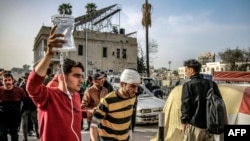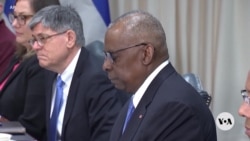Israel’s military Thursday reported fighting in the area of the Shifa Hospital in Gaza City, as well as in Khan Younis in the southern Gaza Strip.
The health ministry in the Hamas-run Gaza Strip said Thursday that 62 Palestinians had been killed during the previous day.
The ministry said at least 32,552 people have been killed during Israel’s counteroffensive, which began in October after a Hamas attack on Israel that killed 1,200 people.
In a reversal, Israel agreed Wednesday to send its war strategists to Washington to discuss its intention to launch a ground assault on Hamas militants in the southern Gaza city of Rafah.
On Monday, Israel had called off the trip in protest of the U.S. refusal to veto a U.N. Security Council resolution calling for an immediate cease-fire in the Israeli-Hamas war.
The United States, Israel’s staunchest ally in the nearly six-month war, abstained from this week's U.N. vote after vetoing similar resolutions earlier. That drew a rebuke from Israeli Prime Minister Benjamin Netanyahu, evidence of a growing split with Washington over Israel’s conduct of the war.
But even as Netanyahu called off a trip by one set of his war strategists, Defense Minister Yoav Gallant was in Washington for talks this week with U.S. Defense Secretary Lloyd Austin and Secretary of State Antony Blinken.
Netanyahu has said a Rafah attack is necessary to erase any Hamas control of Gaza, the narrow enclave along the Mediterranean Sea. But the U.S. has told Israel it is opposed to a Rafah invasion, especially since more than a million Palestinian civilians are sheltered there in makeshift tents and structures.
Israel has said it will move the Palestinians to safety before any attack on four Hamas battalions based in Rafah, but it has not indicated where it would send them.
While maintaining that the U.S. abstention was “very, very bad,” Netanyahu told visiting U.S. Republican Senator Rick Scott that his initial cancellation of the Israeli delegation’s trip “was a message first and foremost to Hamas: Don’t bet on this [United Nations] pressure [for a cease-fire]. It’s not going to work.”
Netanyahu said the Security Council vote “encouraged Hamas to take a hard line and to believe that international pressure will prevent Israel” from achieving its war aims. Israel has vowed to keep fighting until the Hamas military is destroyed and the remaining 100 or so hostages it is holding are freed.
The White House said that it was “a good thing” to hold more talks with Israeli officials and that a date is being discussed.
Senator Roger Wicker, the ranking member of the Senate Armed Services Committee, said Thursday he and 10 other Republican senators have expressed their concern to U.S. President Joe Biden that planning for the temporary pier to deliver humanitarian aid to Gaza has not taken into account U.S. force protection.
“We are gravely concerned that the Department of Defense has given too little consideration to the likelihood that Hamas, Palestinian Islamic Jihad (PIJ), and other U.S.-designated terrorist organizations operating in Gaza would attempt to attack the U.S. personnel that will be deployed to this mission,” the senators said in a letter dated March 21. They went on to note the pier will only add to ports of entry already backlogged with humanitarian aid deliveries.
The war started with the October 7 Hamas terror attack on Israel that killed 1,200 people and led to the capture of about 250 hostages. More than 100 were released in November during a weeklong cease-fire.
The death toll from the health ministry in Gaza includes Hamas fighters and civilians, with the ministry saying two-thirds of the dead are women and children. The ministry says in addition to those killed, nearly 75,000 other people have been injured.
Some information in this report came from The Associated Press, Reuters and Agence France-Presse.









